France's divisive reckoning with MeToo: 'It's been brewing for years'
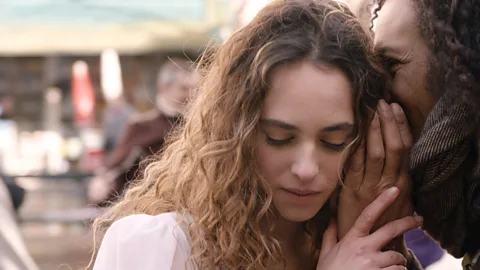 Courtesy Cannes Film Festival
Courtesy Cannes Film FestivalAt this year's Cannes Film Festival, a new generation of young female film-makers is calling out sexual violence and sexism in the industry on screen.
Breaking the silence surrounding the experience of sexual abuse has been a constant motto of the #MeToo movement. At the Cannes Film Festival in France, female actors and film-makers are doing it perhaps the best way they know how – on screen.
Historically, #MeToo hadn't had the same cultural impact in France as in the US, although the French had their own pithy hashtag for it – #balancetonporc, or "call out your pig". Then, in 2018, as the movement was getting started, 100 female artists, including legendary French actress Catherine Deneuve, wrote an open letter to Le Monde newspaper expressing concerns about it, saying "the liberty to seduce and importune is essential to sexual freedom".
But a new generation of young, and mainly female film-makers don't seem to share those sentiments, and this year's Cannes, French cinema's biggest public platform, has been the setting where the debate around misconduct within their film industry has converged with movies with an uncomfortable female gaze on society's expectations of them.
"French attitudes towards morality and sex have historically always been different to the US," journalist and writer Agnès Poirier tells the BBC. "But it's been brewing for years and it feels that 2024 is different."
The festival began last week against the backdrop of revelations that France's most famous actor, 75-year-old Gérard Depardieu, would stand trial this autumn on charges of alleged sexual assault while working on a film set in 2021, which he denies. Days before the event got underway, rumours circulated that a list of up to 10 leading figures in the French film industry accused of misconduct would be publicly released during the festival – although these haven't materialised. On the first day of Cannes, nine women publicly accused veteran French producer Alain Sarde of abuse, allegations he denies.
 Courtesy Cannes Film Festival
Courtesy Cannes Film Festival"It's different this time because of actor Judith Godrèche's revelations of the last few months which has prompted a parliamentary investigation in France," Poirier says.
Fifty-two-year-old Godrèche went public with allegations of sexual abuse by two directors when she was a young teenager and working in movies, something both film-makers, Benoît Jacquot and Jacques Doillon, have denied.
Godrèche was at Cannes to premiere her film Moi Aussi ("Me Too"). The 17-minute short features around 1,000 survivors of sexual abuse who converged together in Paris on one day in March 2024. The participants cover their mouths in a symbolic gesture of silence, but as the audience hears fragments of personal testimonies, the mood gradually changes to one of lightness as they begin to dance with each other in the street.
She tells the BBC that she wants to put France's attitude towards sexual violence under the spotlight. "It's important to me that this movie travels," she says, "and it's important to me that the world is aware of how France is dealing with all these topics, because I feel that the public opinion, worldwide, will have an impact on our country, and on the way our country wants to be seen abroad.
"For me, it's about saying to lawmakers and the government, 'you have to take this seriously, there's a problem'. And look, everybody knows. You knew, we knew, and now everybody knows."
Another French actor, Noémie Merlant, tells the BBC that the impact on her after the first wave of the #MeToo allegations was the inspiration behind her film The Balconettes, which also played at this year's festival as part of the Cannes Official Selection. Merlant directs, co-writes and stars in this gory comedy, which takes place in Marseilles during the hottest day of the year, when three female flatmates square up to some of the abusive men in their lives.
Best known for her role in Céline Sciamma's epic historical love story, Portrait of a Lady on Fire, in which she starred opposite Adèle Haenel, another high-profile supporter of the French #MeToo movement, and who in 2023 publicly quit the cinema industry, citing "complacency" over sexual abuse. Sciamma also co-wrote The Balconettes with Merlant.
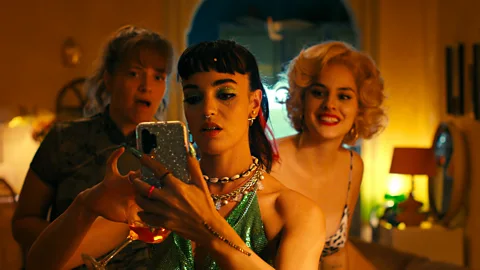 Courtesy Cannes Film Festival
Courtesy Cannes Film Festival"When I first had the idea for the film, it was from what happened in real life," Merlant says. "The #MeToo movement changed the way I saw the world; I saw the patriarchal world we're living in. I hope the movie is deeper than just a 'metoo' movie, but the movement did give me confidence to explore these ideas.
"I wanted the movie to be colourful, to be punk, to be violent because I wanted it to be cathartic and I wanted to explore the vulgarity of women because that's not looked at very much."
Merlant also agrees that "there is a sense of rage" in the film but adds that she "loved to put it together with comedy. The humour lets it have a bit of distance, to speak about these very traumatic things".
More like this:
Another film showing at the Cannes sidebar Semaine de la Critique by French-Algerian director Emma Benestan, called Animale, is a Western-style drama set amongst the world of bullfighting in southern France. A young woman, Nejma (played by Oulaya Amamra), wants to work in the ring but faces possibly even more danger from the all-male team she works with than the bulls themselves.
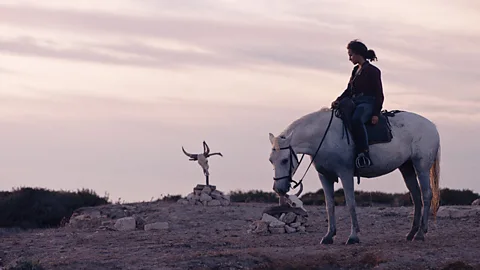 Courtesy Cannes Film Festival
Courtesy Cannes Film Festival"It's so important so talk about these things in film," Amamra tells the BBC. "There's a scene in this film where Nejma lets out a yell, and I find this so liberating, because you know, we're so fed up of whispering all the time. We are entitled to yell out all our rage inside."
A 'generational shift'
But as well as expressing their disquiet about the issues of sexual consent, the work of these up-and-coming directors shines the spotlight on the objectification of women in society. Wild Diamond, a film in the Cannes Competition from first-time French film-maker Agathe Riedinger, is about the life of 19-year-old Liane, who auditions for a reality TV show and is prepared to go to extreme lengths with her body to become an influencer.
Riedinger tells the BBC she'd been wanting to make the film for at least seven years and was fascinated by the impact of reality shows, particularly on women. "There's this new modern mythology being shaped through them, because at the core, there's a very conservative attitude towards them, full of repugnance and discontent for these social classes," she says. "I also wanted to examine the rape culture, the competitiveness amongst women, the hyper-sexualisation of women, and how everything is magnified and exposed through social media."
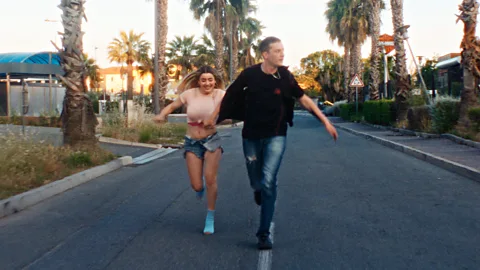 Courtesy Cannes Film Festival
Courtesy Cannes Film FestivalThe director thinks that there is now a generational shift in views about what kinds of films should be made and watched in French cinemas, and that helped her get the movie made last year. "Seven years ago, there was a prevailing, a sort of despising, attitude towards my subject – it was just not considered as interesting by the intellectuals that normally rule cinema and literature as well," she says.
"I had a hard time making them understand the depth of it. But then, there was a shift with the media movement, a shift in attitudes, and that's prompted them to see that maybe the audience's taste is changing. Then there was a real interest in seeing someone like Liane on screen."
One of the most talked-about films at Cannes has been French director Coralie Fargeat's The Substance, a body horror comedy drama starring Demi Moore as an older actor who's fired by her network, and who takes drastic action to recreate her younger self. It's Fargeat's second film after 2017's action horror Revenge, which saw a young woman take on the men who rape her and leave her for dead.
On the inspiration for The Substance, Fargeat says that it was turning 40 that depressed her. "I don't know a single woman who doesn't have a troubled relationship with her body," she tells the BBC. "At only 40, I thought 'this is the end of my life. I won't be able to be valued, loved, my life is over.' I am a feminist and yet all this had still permeated my brain – that past a certain age, I was worth nothing. So I decided to confront it and write this film.
"Bodies here in this film are going to be tyrannised, ridiculed, destroyed, the same way I truly believe society destroys women with all the rules that we are silently taught to follow."
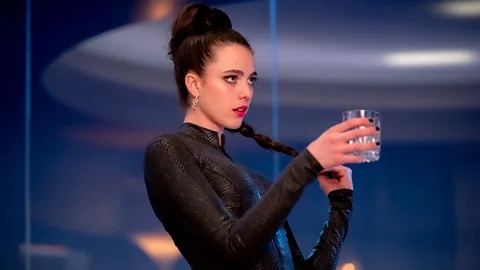 Courtesy Cannes Film Festival
Courtesy Cannes Film FestivalAlthough no one can predict whether the Cannes Film Festival jury will reward another film with shock body themes (Julia DuCournau's film Titane won the Palme d'Or at Cannes three years ago), with an actor as prolific as Moore in the lead role (an actor who ironically has been consistently celebrated for her body) as well as strong reviews, this film is likely to also make waves around the world.
Along with another French director, Justine Triet, who made the Oscar-winning film Anatomy of a Fall, this is a new wave of female film-makers who can rival the fandom that's previously been reserved for male auteurs at Cannes – even if only four women have films in the prestigious Competition this year.
Meanwhile, the debate over historical alleged misconduct within the French industry is likely to intensify in the coming months, with the publicity surrounding Gérard Depardieu's trial. His career has been so prolific, the recent history of French film itself might seem to be on trial too.
Watch the Cannes Film Festival Special on Talking Movies this weekend, 25/26 May.
--
If you liked this story, sign up for The Essential List newsletter – a handpicked selection of features, videos and can't-miss news, delivered to your inbox twice a week.
